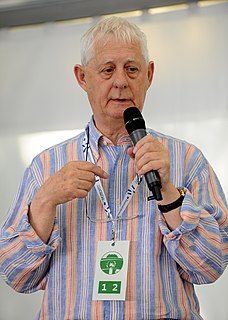A Quote by George Orwell
The point is that we are all capable of believing things which we know to be untrue, and then, when we are finally proved wrong, impudently twisting the facts so as to show that we were right. Intellectually, it is possible to carry on this process for an indefinite time: the only check on it is that sooner or later a false belief bumps up against solid reality, usually on a battlefield.
Related Quotes
The real, then, is that which, sooner or later, information and reasoning would finally result in, and which is therefore independent of the vagaries of me and you. Thus, the very origin of the conception of reality shows that this conception essentially involves the notion of a COMMUNITY, without definite limits, and capable of a definite increase of knowledge.
The criminal misuse of time was pointing out the mistakes. Catching them?noticing them?that was essential. If you did not in your own mind distinguish between useful and erroneous information, then you were not learning at all, you were merely replacing ignorance with false belief, which was no improvement. The part of the man's statement that was true, however, was about the uselessness of speaking up. If I know that the teacher is wrong, and say nothing, then I remain the only one who knows, and that gives me an advantage over those who believe the teacher.
Those who know in their hearts that they are not really necessary -- and are entirely replaceable-- must inevitably be tempted to misrepresent the nature of their work and build up a false notion of its importance. A further alienation from truth takes place, a further loss of contact with reality. And one thing we can be sure of is that self-deception, whether on the level of the wind and the rain or on that of spiritual reality, must always come up against the real sooner or later, and that its destruction is very painful.
Recognize that it is not really possible to steadily help others when we ourselves are not in good physical, mental, or emotional state. We may be able to carry on for a while, but sooner or later we end up feeling depleted, discouraged, or weak. We cannot keep on giving when we are running on an empty tank. We need to be solid.
From the time we begin school, if not sooner, we are taught to be blind to our assets and only see our deficits. We are carefully marked on how many we got wrong on a test and, rarely if ever, asked how we know how to spell the ones we got right. By the time we are adults, we are well versed in every one of our limitations, skilled in our incompetence. If we were fish in an aquarium, it would be as if we kept smashing against the glass, and forgot the fact that we were perfectly capable of turning ever so slightly and swimming gracefully in the water all around us.
When we stop believing in gods we can start believing in their stories, I retort. There are of course no such things as miracles, but if there were and so tomorrow we woke up to find no more believers on earth, no more devout Christians, Muslims, Hindus, Jews, why then, sure the beauty of the stories would be a thing we could focus on because they wouldn't be dangerous any more, they would become capable of compelling the only belief that leads to truth, that is, the willing, disbelieving of the reader in a well-told tale.
Yet, isn't it strange, isn't it weird, how we can KNOW that someone is not behaving in the way we imagine, and at the same time we can be totally convinced that he is! How clever the human mind is, that it can accept two contradictory things as 'facts.' Yes, I know that in this case one 'fact' was untrue. But the human mind can KNOW something is untrue and still accept it as a 'fact,' and act on it as if it were true.
The whole point of science is that most of it is uncertain. That's why science is exciting--because we don't know. Science is all about things we don't understand. The public, of course, imagines science is just a set of facts. But it's not. Science is a process of exploring, which is always partial. We explore, and we find out things that we understand. We find out things we thought we understood were wrong. That's how it makes progress.
Many, and I think the determining, constitutive facts remain outside the reach of the operational concept. And by virtue of this limitation this methodological injunction against transitive concepts which might show the facts in their true light and call them by their true name the descriptive analysis of the facts blocks the apprehension of facts and becomes an element of the ideology that sustains the facts. Proclaiming the existing social reality as its own norm, this sociology fortifies in the individuals the "faithless faith" in the reality whose victims they are.





































